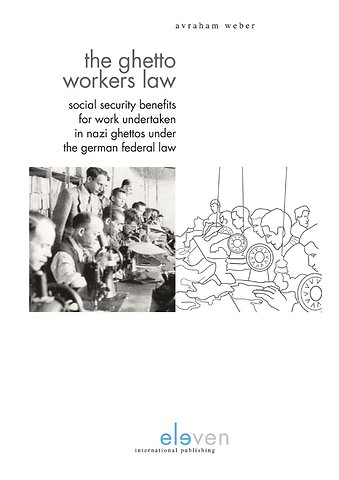The Ghetto Workers Law
Social Security Benefits for Work Undertaken in Nazi Ghettos under the German Federal Law
Samenvatting
Under the Nazi regime, tens of thousands of Jews lived in ghettos, working more or less normal jobs. Some of these ghettos had their own employment centers, and some employers even paid into retirements funds. Legislation known as “German Pensions for Work in Ghettos,” or by its German acronym, ZRBG (Gesetz zur Zahlbarmachung von Renten aus Beschäftigungen in einem Ghetto) 1 was passed in 2002 to grant pensions to some of these former laborers.
But more than ten years after its passage, its implementation was still subject to considerable conflict, mainly until the the ZRBG-ÄndG (the Ghetto pension reform law) from August 2014 came into life, allowing fundamental jurisprudence to be incorporated in the form of legislation. For many years, former laborers in Nazi ghettos have been fighting to get the pension that this law ostensibly guarantees them, but the vast majority of their applications have been rejected. Since 2002, around 70,000 survivors have invoked the ZRBG. However, over ninety percent of these applications were initially rejected by German authorities for various legal and practical reasons.
This book is an attempt to summarize the major steps in the implementation of the law. It begins with an overview of the historical background, and then will shift focus to the judicial, diplomatic, political, and practical problems with the implementation of the ZRBG.
This book is interesting for academics in the field of international procedural law and is particularly of interest for those interested in German restitution law.
Trefwoorden
Specificaties
Inhoudsopgave
Opening Remarks xiii
Glossary xvii
1 The Development of the German Restitution Law 1
1.1 Global Arrangements and the BEG 1
1.2 The Regime of External Laws to the BEG 3
1.2.1 The Passing of the BEG-Schlußgesetz 4
1.2.2 The Founding of the Goodwill Fund – Jewish Claims Conference Administration 6
1.2.3 The Reunification of Germany – a Missed Opportunity? 7
1.3 The German Social Security System and Compensations 9
1.3.1 Creating Basic Structures for Exporting Social Security Payments 9
1.3.2 The Creation of a Legal Framework for Survivors under the Social Security Law 12
1.3.2.1 Jewish Ghetto Workers 12
1.3.2.2 The Legal Framework 13
1.3.2.2.1 Establishing the Liability of the Social Security System 13
1.3.2.2.2 Legal Regulations for Compensation under the Social Security System 15
2 The Ghetto Workers under the Social Security Law 17
2.1 The Situation Prior to the ZRBG 17
2.1.1 Applications in Accordance with the Social Security Law 17
2.1.2 The Change of Legislation, and the BSG Decision Concerning Sofie Bild 19
2.2 The Legislation for Payment of Pensions for Employment in a Nazi Ghetto 21
2.2.1 The Principles of the Ghetto Workers’ Law (ZRBG) 22
2.2.1.1 Opening the Social System to Ghetto Workers 23
2.2.1.2 The Export of Social Benefits Abroad 24
2.2.1.3 Fictive Payments of Deductions 26
2.2.1.4 The Right to Retroactively Buy Social Security Insurance Periods – Applicable under the ZRBG? 29
2.2.1.5 Commencement of the Social Benefits and Their Extent 31
2.2.2 ZRBG – the New Legal Order 33
3 Practical Problems in the Implementation of the ZRBG 35
3.1 The Dispute Regarding the Implementation of the ZRBG: 20 June 2002-
31 December 2005 35
3.1.1 Taking Stock: One Year of ZRBG 36
3.1.1.1 The Report Presented to Parliament 36
3.1.1.2 The Legal Dispute between the Government and Holocaust Survivors 37
3.1.2 The Road to Legal Discussion Concerning the ZRBG – Parliament’s Inability to Resolve the Issue and Bridge the Gap between the Sides 38
3.2 The Circles of Claimants According to the ZRBG 40
3.2.1 Persecuted Persons 40
3.2.1.1 Historical Background 40
3.2.1.2 Legal Integration of the Historical Background 42
3.2.2 A Ghetto 43
3.2.2.1 Historical Definition 43
3.2.2.2 The Legal–Historical Background of Defining a Ghetto under Compensation Laws 46
3.2.2.3 ‘Ghetto’ According to the ZRBG 48
3.2.2.3.1 General Outline of the Problems of Defining a Ghetto According to the ZRBG 48
3.2.2.3.2 The Case of the Ghetto at Theresienstadt 49
3.2.2.3.3 The Lesson of the Theresienstadt Ghetto in the Wider Context 51
3.2.2.4 Conclusion Regarding the Legal Definition of a Ghetto 52
3.2.3 The Question of the Area in Which a Ghetto Was Located 53
3.2.3.1 The Lodz Ghetto – ‘Reichsgau Wartheland’ 54
3.2.3.1.1 The First Ghetto 54
3.2.3.1.2 The Lodz Ghetto and the Territorial Question 55
3.2.3.1.3 Legal Solution for the Lodz Ghetto – a New General Law? 56
3.2.3.2 The Warsaw Ghetto – ‘Generalgouvernement’ 57
3.2.3.2.1 The Warsaw Ghetto – the Legal Discussion 59
3.2.3.2.2 The Warsaw Ghetto – the Situation According to §1 ZRBG 60
3.2.3.2.3 The Warsaw Ghetto – the Historical Debate 61
3.2.3.3 The Schaulen Ghetto – the Case of Ghettos in the Baltics 62
3.2.3.3.1 The Schaulen Ghetto – the Legal Definition of Eastland (Ostland) 64
3.2.3.3.2 Legal Consequences of the Historical Opinions on the Ostland 65
3.2.3.4 The Budapest Ghetto – the Question of German Presence in Hungary 65
3.2.3.4.1 The Budapest Ghetto – Historical Background 66
3.2.3.5 Transnistria Region – What Does de facto Control Mean? 68
3.2.3.5.1 The Region of Transnistria – Historical Background: the Opening of the Eastern Front 69
3.2.3.5.2 The Geographical Definition of the Territory of Transnistria 70
3.2.3.5.3 The Tighina Accord 70
3.2.3.5.4 Joint Control and §1 ZRBG 71
3.2.3.6 Amsterdam – the Case of Ghettos in the West 78
3.2.3.6.1 Amsterdam and the Creation of a Ghetto in Western Europe 79
3.2.3.6.2 Amsterdam, ZRBG and the Definition of a Ghetto 80
3.2.3.7 Czernowitz – What Are the Territorial Borders of the ZRBG? 82
3.2.3.7.1 Czernowitz Following the Opening of the Eastern Front 82
3.2.3.7.2 Czernowitz – Recognized Ghetto under Compensation Law 83
3.2.3.7.3 Czernowitz – Status under International Law 84
3.2.4 Working Relations in the Ghetto 87
3.2.4.1 Forced Labour – the Parallel Legal Issue of the EVZStifG Compensation Agreement – Fifty-Five Years after the War? 87
3.2.4.1.1 Creating a Compensation Agreement after Fifty-Five Years 88
3.2.4.1.2 Orientating the Compensation Agreement under Existing German Compensation Law 89
3.2.4.2 Establishing Work Relations in a Ghetto Recognized by Social Security 94
3.2.4.2.1 The Problems in Establishing Social Law Elements in a Ghetto 94
3.2.4.2.2 The Ability to Formulate Free Will in a Ghetto 101
3.2.4.2.3 Remuneration for Ghetto Workers 109
3.2.4.3 Creating a New Legal Structure for Ghetto Workers 121
3.2.4.3.1 The ‘Acknowledgement Directive’ 122
4 Substantiation (Glaubhaftmachung): the Social Court Travels Abroad 131
4.1 Substantiation and the ZRBG 132
4.1.1 Holocaust Survivors in Israel 134
4.2 Substantiation – Bypassing the Territorial Limit 135
4.2.1 The Legal Framework of Transposing Sovereign Legal Borders 135
4.2.1.1 Legal Framework of the Hague Convention and Social Security Law 137
4.2.1.2 The Case of ZRBG Hearings in Israel 137
5 Retroactive Payments in Accordance with the ZRBG 141
5.1 Retroactive Payments in Accordance with ZRBG Legislation 142
5.2 Retroactive Payments in Accordance with the General Social Security System 143
5.2.1 New Legal Definition –§100 (4) SGB VI 143
5.2.2 Compromise on the Retroactive Payments under §44 SGB X 145
5.2.2.1 The Arrangement of §44 SGB X and the ZRBG 146
5.2.2.2 The Practical Effects of §44 SGB X and ZRBG 146
5.2.2.2.1 Practical Outcome of the Decision on Retroactive Payments 147
5.2.2.2.2 Supremacy of §44 SGB X 148
5.2.2.2.3 Constitutional Thoughts Based on §3 GG 148
5.2.2.2.4 The Applicability of DISVA to the Date of Application 149
5.2.2.2.5 Compensatory Supplement for Retroactive Payments Not Paid out in Full 149
5.2.3 DISVA and the Ability to Backdate an Application 150
5.2.3.1 Date of Application and DISVA 151
5.2.3.1.1 Supreme Social Court Intervenes Again 152
5.2.3.1.2 Authorities’ Implementation of the BSG Decision 152
5.2.3.1.3 The Decision’s Practical Implementation 153
5.2.4 Parliamentary Debate on the Question of Retroactive Rights 153
5.2.4.1 Parliament Deliberates on the Matter 154
5.2.4.1.1 The Supreme Social Court’s Decision Concerning §44 SGB X 156
5.2.4.2 The Opposition’s Joint Initiative – the Solution? 157
5.2.4.2.1 The Motion 157
5.2.4.2.2 Different Legal Sources for Solving the Retroactive Question 157
5.2.4.2.3 The Relevant Solution – Bringing the Issue at Hand to an End 158
6 ZRBG-ÄndG – a Revised Ghetto Workers Legislation 161
6.1 Retroactivity and Territorial Scope of the ZRBG 161
6.2 Amending the ZRBG? 163
6.2.1 Federal State Initiative 163
6.2.2 Coalition Agreement of 2013 164
6.2.3 Joint German–Israeli Cabinet Meeting 164
6.3 ZRBG-ÄndG 165
6.3.1 The Original Draft of Law 165
6.3.2 Cabinet Proposal 166
6.3.2.1 General Amendments Proposals 166
6.3.2.2 Amendments Relating to Retroactive Payments 166
6.3.2.2.1 General Amendment to the Fictional Date of Application 166
6.3.2.2.2 Changes Regarding General Provision of the Social Law 167
6.3.2.2.3 Backdating the Applications 167
6.3.2.3 Amendments Regarding the Territorial Scope of the Law 168
6.4 Open Questions 170
6.4.1 Bilateral Social Security Treaties – Poland 170
6.4.2 Rights of Heirs of Survivors 171
6.4.3 ZRBG-ÄndG – End of the Story? 172
7 Closing Remarks 175
Bibliography 183
Anderen die dit e-book kochten, kochten ook
Net verschenen
Rubrieken
- aanbestedingsrecht
- aansprakelijkheids- en verzekeringsrecht
- accountancy
- algemeen juridisch
- arbeidsrecht
- bank- en effectenrecht
- bestuursrecht
- bouwrecht
- burgerlijk recht en procesrecht
- europees-internationaal recht
- fiscaal recht
- gezondheidsrecht
- insolventierecht
- intellectuele eigendom en ict-recht
- management
- mens en maatschappij
- milieu- en omgevingsrecht
- notarieel recht
- ondernemingsrecht
- pensioenrecht
- personen- en familierecht
- sociale zekerheidsrecht
- staatsrecht
- strafrecht en criminologie
- vastgoed- en huurrecht
- vreemdelingenrecht







